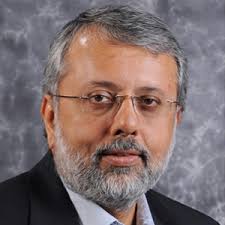“With a growing population and depleting water resources, we need to rethink our approach.”My heading is awesome
Shri Ranganath N K is the area Managing Director, INDO region, Grundfos. He joined Grundfos in February 1998 and established Grundfos India in March 1998. He has more than 36 years of industry experience covering marketing, sales, design, project management, finance and human resources.
Prior to joining Grundfos, Ranganath was the Director of IAEC Industries. His first job was with Eicher Tractors in sales. He has been involved in technology transfer to India from other countries including Denmark and his focus has been on Water and Energy Conservation.
He holds a Degree in Mechanical Engineering from College of Engineering, Guindy (1978) and Post-Graduation in Business Administration (P.G.D.B.A.,) from XLRI, Jamshedpur (1980).
Ranganath is currently the co-chair of the CII National committee on water and the Southern regional Chair for the committee on ease of doing business.
He has been a member of CII National Committees on Manufacturing, Water, CSR and Skill Development. He also has held positions of: Member of the Executive Council of Indian Green Building Council (IGBC), Past Chairman of Confederation of Indian Industry (CII), Tamil Nadu Council, Past Chairman of AEEE (Alliance for an Energy Efficient Economy) and Past President of Madras Management Association.
In an exclusive interview, Shri Ranganath NK shares with Marie Banu an integrated approach to manage water and wastewater.
Grundfos is focused on promoting the UN Sustainability Development Goal (SDG) 6, which focuses on water and SDG 13 which focuses on climate change. Can you tell us about your efforts in these areas so far?
We operate our business with sustainability as a core mindset and have anchored our innovative solutions in order to contribute to the UN’s Sustainability Development Goals (6 and 13). We have a three-pronged approach towards these SDGs.
Firstly, from a business opportunities perspective, we have identified specific demand-supply gaps for sustainable products and have been working towards bridging this gap. Secondly, from a risk perspective, we have analysed our risks to evaluate any damage to the environment and understand best practices that can be followed. Thirdly, from a community perspective, Grundfos has been collaborating with various stakeholders such as NGOs, governments and our own employees through constructive dialogues and platforms.
Since 2008, we have successfully managed to reduce water consumption by over 34% and reduce our CO2 emissions by 31% globally. From 2014, we have also been able to help over 1.6 million people globally access clean drinking water. These are just a few testaments of our commitment to creating an environmentally sustainable future.
About the solar-powered pumping systems in 100 villages in India launched by Grundfos Foundation and Sunlit Future?
India has over 700,000 water deprived villages. Understanding the implications of water scarcity and its impact on communities, we partnered with Sunlit Future in 2014 to provide 100 solar pumps to 100 villages.
The solar-powered pumping systems with Grundfos’ SQ Flex pumps will ensure a stable water supply for each village. The SQ Flex pump motor is constructed especially for energy sources with varying voltage, such as solar energy or wind power. Furthermore, the pumps are extremely energy efficient and long-lasting.
Grundfos India already has thousands of solar pump installations across Maharashtra, Bihar, Chhattisgarh, Madhya Pradesh, Gujarat, Uttar Pradesh, Tamil Nadu, and Andhra Pradesh. Through these solar pump solutions, Grundfos India has helped create a positive impact on the socio-economic lives of thousands of people in rural India.
The project was undertaken in four phases across villages in Odisha, Maharashtra, Madhya Pradesh and Uttar Pradesh. This ‘100 pumps, 100 villages’ initiative positively impacted over 50,000 people in these states.
With government planning to give a push to renewable energy sector, are you seeing an increase in demand for solar-powered pumps in the country?
The Indian government’s ambitious target to reach 450 GW renewable energy capacity has definitely rejuvenated the interest in the sector. Solar energy solutions are driving the growth due to some of the lowest tariffs in the world.
The Prime Minister’s KUSUM scheme has further increased the availability of solar pumps at subsidized costs to farmers. This has helped increase awareness and large-scale adoption of these pumps in off grid or remote areas. With over 2 lakh pumps installed till date, we are seeing an increased interest in making efficient solar pumps a preferred alternative.
Your thoughts on integrated approach to managing water and wastewater?
With a growing population and depleting water resources, we need to rethink our approach towards water management by engaging with stakeholders and implementing the right technology. The Ministry of Jal Shakti has been able help us set water goals and come up with a unified strategy to tackle challenges.
A shift towards a circular economy where water is reused multiple times will help optimize water usage, reusage and consumption. Wastewater treatment is a critical component in a successful circular economy. Collaborative efforts are needed to ensure that wastewater treatments are a mainstay in our homes, offices and municipalities. Wastewater should be treated as a source of water and therefore water should be priced similarly to electricity.
Can NGOs associate with Grundfos in taking your mission forward? If so, what are the processes involved?
We are always on the lookout for the right partner to help us augment our community campaigns. In the past, we have worked with several NGOs like Hand in Hand and Sunlit Future and other local NGOs to create awareness, provide training and improve access to clean, drinking water.
We are also working on restoring water bodies in Chennai – thereby improving the water quality and recharging the water table in these locations. Besides, we work with the CII on promoting water stewardship and increasing awareness on water management and conservation.

Leave a Reply
You must be logged in to post a comment.

No Responses